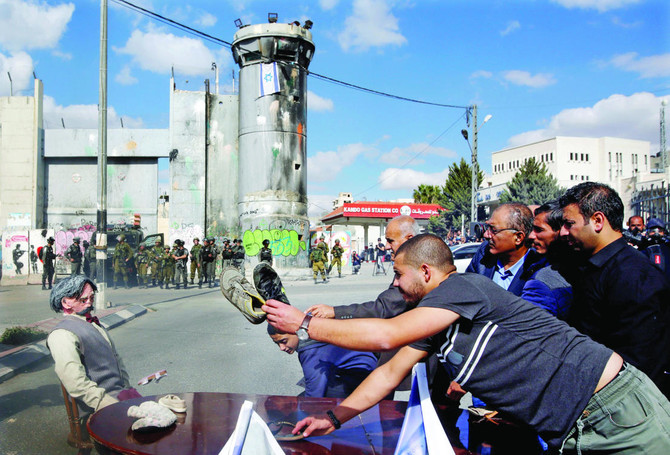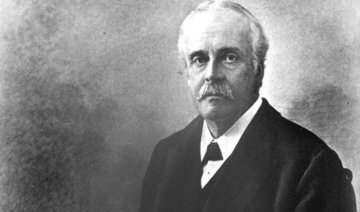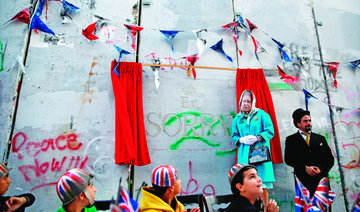LONDON: The UK government’s continued refusal to apologize for the 1917 Balfour Declaration has been criticized by those who see the document as being at the root of today’s Israeli-Palestinian conflict.
The growing demand for an apology is accompanied by pleas for a critical review of the UK’s foreign policy and its responsibilities toward the Palestinians.
“An apology is an important symbolic act,” said Prof. Ilan Pappé, director of the European Centre for Palestine Studies at the University of Exeter. “But it should be accompanied by a sense of accountability, hence what I suggest is that a change of British current policy on Palestine is the best way to atone for the Balfour Declaration,” he said.
Today marks the centenary of the date of the controversial document. It was signed in 1917 by then-Foreign Secretary Arthur Balfour, who expressed his support for the creation of a “national home” for the Jewish people in Palestine and set in motion a series of events resulting in the creation of Israel in 1948.
The document also pledged that the “civil and religious rights” of existing non-Jewish communities in Palestine would not be prejudiced, a promise that many argue the UK has broken, and for which the Palestinian people are now owed an apology.
“For decades one of the biggest grievances the Palestinians have is that there has been no recognition that they have been dealt an injustice,” said Karl Sabbagh, a Palestinian writer and documentary producer.
“Regardless of whether this injustice is rectified or not, it is a slap in the face to be told, effectively, ‘you have no grounds for complaint’,” he said.
The UK-based campaigning group, the Palestinian Return Centre, relaunched its Balfour Apology Campaign on Oct. 25, demanding that the UK government acknowledge its responsibility in the current divide between Israelis and Palestinians. The campaign is running a petition to demand an official apology from the government.
The UK has so far rejected calls for an apology, initially issuing an official statement in April that was followed by Prime Minister Theresa May’s address to Parliament in late October, in which she said the government would “certainly mark the centenary with pride.”
Foreign Secretary Boris Johnson wrote in his Daily Telegraph column on Oct. 29 that the declaration was “indispensable to the creation of a great nation,” adding that the document fulfilled an “incontestable moral goal” and provided a “persecuted people with a safe and secure homeland.”
Johnson did go on to acknowledge that the caveat to safeguard the interests of the Palestinians “has not been fully realized.” He backed the concept of a two-state solution to the Israeli-Palestinian conflict, with the borders based on the lines as they were before the 1967 war.
May will be marking the anniversary with a celebratory dinner with her Israeli counterpart Benjamin Netanyahu and a select group of MPs, a move that has angered many who see Israel’s current expansionary policies and settlements in the West Bank as infringing on the rights and wellbeing of the Palestinian people.
There are other celebrations taking place in the UK, including an event organized by Balfour 100 bringing Christians and Jews together at the Royal Albert Hall in London for an evening of music and dance.
“There is also a very active lobbying effort in support of Israel, which has promoted the Balfour centenary as a time to celebrate the British-Israeli relationship rather than to take a critical view of the legacy of the declaration,” said Adam Sutcliffe, reader of history at King’s College London. Sutcliffe is also a member of the Independent Jewish Voices steering committee, which has recently produced a film called “100 Years After Balfour,” which examines the politician’s legacy.
“The UK government has, it seems, been persuaded that many British Jews would be very unhappy if they did not support this celebration,” he said.
Many are unhappy about the idea of “celebrating” the declaration, and rather call for the government to use the centenary as a chance to learn from the past.
“It is not an anniversary to celebrate,” said John Bond, spokesperson for the Balfour Project, a UK-based organization which aims to educate the government about the legacy of the declaration.
“It is a time to look afresh at the declaration and its outcomes,” he said. “We will continue working for an apology from our government. An apology is not just words. It must include a commitment to help improve the conditions in which many Palestinian people live, and to work for a just political settlement,” he said.
It is important that efforts to secure an apology are not misinterpreted as a way of questioning Israel’s right to exist, said Miranda Pinch, an activist and producer of a new documentary on the legacy of Balfour.
“I think that what is sought is an acknowledgment of accountability and failure on the part of the UK government, rather than an apology as such,” she said. “The problem with an apology is that it can be seen as a regret about the creation of Israel and, at this stage, I don’t think that would be helpful for anyone.”
She added that the UK government has failed “to hold Israel accountable in any meaningful way for its continued human rights violations, illegal occupation and land theft of what was left of historic Palestine.”
Sutcliffe added: “I’m not sure how helpful an official British apology would be; once the UK government starts to apologize for its colonial past, there would be many other apologies to make also.
“However, the UK government should certainly not be celebrating the Balfour Declaration. It should be encouraging a nuanced and critical approach, focusing attention on the negative impact of the declaration on Palestinians, who continue to suffer and to be denied basic justice and human rights, whether in the occupied West Bank, effectively still blockaded in Gaza, or in refugee camps elsewhere.”
UK’s refusal to apologize for Balfour draws criticism
UK’s refusal to apologize for Balfour draws criticism

UAE warns against ‘miscalculated actions’ in Israeli-Iranian conflict, calls for immediate ceasefire
UAE warns against ‘miscalculated actions’ in Israeli-Iranian conflict, calls for immediate ceasefire

- Foreign Minister Sheikh Abdullah bin Zayed Al-Nahyan says Emirati leadership is dedicated to promotion of stability, prosperity and justice
- He highlights ‘the risks of reckless and miscalculated actions that could extend beyond the borders’ of Israel and Iran
LONDON: As military exchanges between Israel and Iran continued on Tuesday for a fifth consecutive day, the UAE’s minister of foreign affairs, Sheikh Abdullah bin Zayed Al-Nahyan, warned of the wider threat posed by the continuing conflict and called for an immediate ceasefire.
“There is no alternative to political and diplomatic solutions,” he said, calling on the UN and its Security Council to intervene and halt the escalating violence.
He also highlighted “the risks of reckless and miscalculated actions that could extend beyond the borders” of Israel and Iran, the Emirates News Agency reported.
The UAE believes “a diplomatic approach is urgently required to lead both parties toward deescalation, end hostilities, and prevent the situation from spiraling into grave and far-reaching consequences,” he added.
The goal of international diplomacy, he said, must be to immediately halt hostilities, prevent the conflict from spiraling out of control, and mitigate its effects on global peace and security.
The UAE condemned the Israeli airstrikes on Iran that began on Friday, which have targeted nuclear sites, military leaders, intelligence chiefs and atomic scientists. Iran has responded by firing ballistic missiles at Israeli towns and cities along the Mediterranean, including Tel Aviv, Rishon LeZion and Haifa.
Sheikh Abdullah said the Emirati leadership is dedicated to the promotion of stability, prosperity and justice, and he stressed the urgent need for wisdom in a region long embroiled in conflicts.
“The UAE believes that promoting dialogue, adhering to international law and respecting the sovereignty of states are essential principles for resolving the current crises,” he added.
“The UAE calls on the United Nations and the Security Council to fully uphold their responsibilities by preventing further escalation, and taking urgent and necessary measures to achieve a ceasefire and reinforce international peace and security.”
At least 60 people feared missing in two deadly shipwrecks off Libya, IOM says

- IOM says shipwrecks happened off the Libyan coast
CAIRO: At least 60 people were feared missing at sea after two deadly shipwrecks off the coast of Libya in recent days, the International Organization for Migration said on Tuesday.
Russia says Israel attacks on Iran are illegal, notes Iran’s commitment to NPT

- The statement said Moscow was waiting for the International Atomic Energy Agency to provide “unvarnished” assessments of the damage caused to Iranian nuclear facilities by Israeli attacks
MOSCOW: Russia’s Foreign Ministry on Tuesday denounced continued Israeli attacks on Iran as illegal and said a solution to the conflict over Tehran’s nuclear program could only be found through diplomacy.
A ministry statement posted on Telegram noted Iran’s “clear statements” on its commitment to adhere to the nuclear non-proliferation treaty and its willingness to meet with US representatives.
The statement also said Moscow was waiting for the International Atomic Energy Agency to provide “unvarnished” assessments of the damage caused to Iranian nuclear facilities by Israeli attacks.
Qatari emir and Turkish president discuss Israeli attacks on Iran

- Sheikh Tamim bin Hamad Al-Thani and Recep Tayyip Erdogan emphasize important need to deescalate conflict and find diplomatic solutions
LONDON: Sheikh Tamim bin Hamad Al-Thani, the Emir of Qatar, and Turkish President Recep Tayyip Erdogan on Tuesday discussed Israel’s ongoing attacks on Iran, which began on Friday and have targeted nuclear sites, military leaders, intelligence chiefs and atomic scientists.
During their call, the leaders emphasized the important need to deescalate the conflict and find diplomatic solutions, the Qatar News Agency reported.
Earlier in the day, the Qatari minister of state for foreign affairs, Mohammed Al-Khulaifi, warned during a call with Rafael Grossi, the director general of the International Atomic Energy Agency, that the targeting of Iranian nuclear facilities by Israel represented a serious threat to regional and international security.
The IAEA reported on Monday that an Israeli airstrike on Iran’s Natanz Nuclear Facility on Friday had damaged centrifuges at the underground uranium-enrichment plant, raising concerns about possible radiological and chemical contamination in the area.
Qatari minister of state, IAEA chief discuss ‘serious threat’ of Israeli strikes on Iran’s nuclear sites

- Mohammed bin Abdulaziz Al-Khulaifi reiterates Qatar’s condemnation of attacks on Iranian territory
- He said targeting nuclear facilities threatens regional, international security
LONDON: The Qatari Minister of State for Foreign Affairs Mohammed bin Abdulaziz Al-Khulaifi on Tuesday discussed the conflict between Israel and Iran with Rafael Grossi, the director general of the International Atomic Energy Agency.
Al-Khulaifi discussed in a call the Israeli attacks on Iranian nuclear facilities that began on Friday, targeting the Natanz, Fordo, and Isfahan nuclear sites.
Al-Khulaifi stressed that targeting nuclear facilities was a serious threat to regional and international security. He reaffirmed Qatar’s commitment to dialogue to resolve conflicts and achieve peace in the region.
The officials discussed ways to improve the security of nuclear facilities and ensure they are safeguarded against threats, the Qatar News Agency reported.
Al-Khulaifi reiterated Qatar’s strong condemnation of the Israeli attacks on Iranian territory, deeming them blatant violations of Iran’s sovereignty and security, the QNA added.
The IAEA reported on Monday that the Israeli airstrike on Iran’s Natanz facility on Friday damaged the centrifuges of the underground uranium enrichment plant, raising concerns about potential radiological and chemical contamination in the area.






















